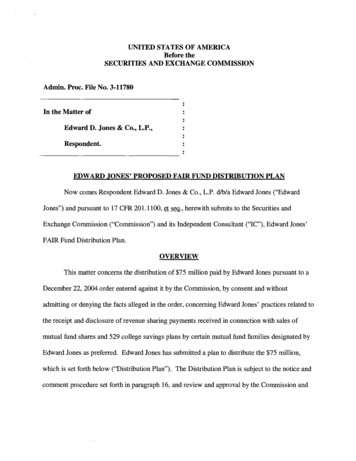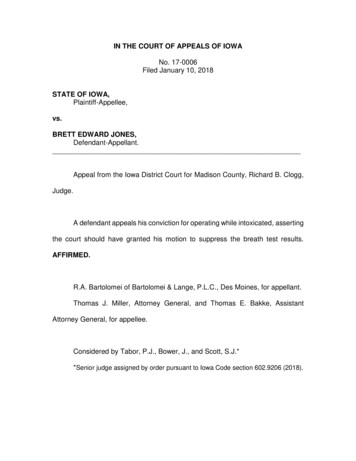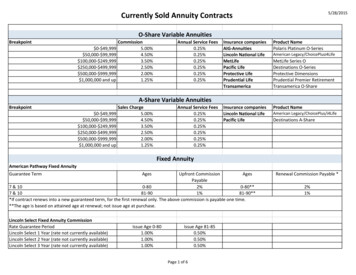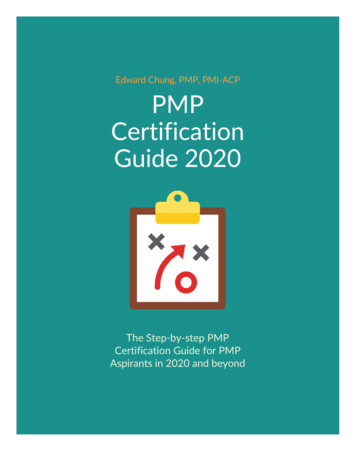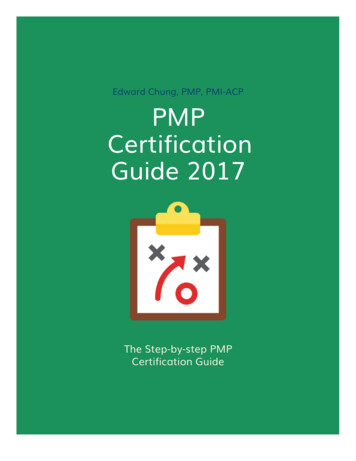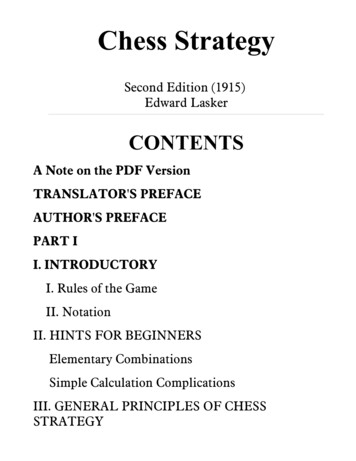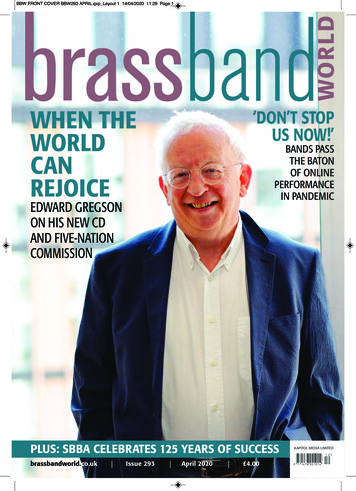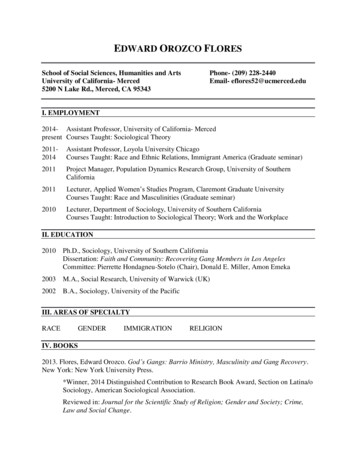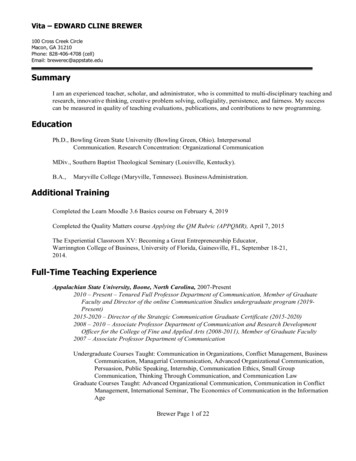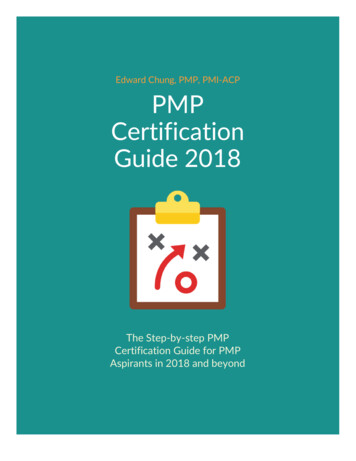
Transcription
[Cite as Kobal v. Edward Jones Secs., 2021-Ohio-1088.]COURT OF APPEALS OF OHIOEIGHTH APPELLATE DISTRICTCOUNTY OF CUYAHOGAJOHN E. KOBAL,:Plaintiff-Appellant,:No. 109753v.:EDWARD JONES SECURITIES,ET AL.,Defendants-Appellees.::JOURNAL ENTRY AND OPINIONJUDGMENT: AFFIRMEDRELEASED AND JOURNALIZED: April 1, 2021Civil Appeal from the Cuyahoga County Court of Common PleasCase No. CV-20-928021Appearances:John E. Kobal, pro se.Porter Wright Morris & Arthur L.L.P., and C. DarcyJalandoni, and W. Hunter West, for appellee EdwardJones & Co., L.P.Darren W. DeHaven, for appellee Kathleen Kobal.MARY J. BOYLE, A.J.:Plaintiff-appellant, John E. Kobal, appeals the trial court’s judgmentdismissing his claims against defendants-appellees, Kathleen Kobal (“Kathleen”)
and Edward Jones Securities (“Edward Jones”), and against defendant KMKConsulting, L.L.C. Appellant raises seven assignments of error for our review:1. Misuse of Res Judicata as an excuse/reason for dismissal of this casedue to fraud and misrepresentation. For res judicata to be properlyapplied as an acceptable doctrine for dismissal, the litigation shall beabsent of fraud/misrepresentation. This case has numerous credibleexamples of fraud/misrepresentation.2. Misuse of Res Judicata as an excuse/reason for dismissal of the casedue to collusion/situational circumstances of collusion betweenPlaintiff Attorney and opposing Counsel. For res judicata to be appliedas an acceptable doctrine for dismissal, the litigation shall be absent ofcollusion and/or situations where collusion was evident consideringactions and/or inactions of the parties. Many credible examples.3. Plaintiff[’s] claims are not barred by [the] statute of limitations.4. Trial Court consistently finding ways to sidestep/avoid discoveryphase of the legal process in Mr. Kobal’s case(s) - including this case.Discovery protects the integrity of a fair proceeding and a fair trial forall parties.5. Dismissal of KMK Consulting, L.L.C. was unjustified, improper andlegally abusive considering the overwhelming evidence, circumstances,obvious identity differences regarding specific offenses for specificdefendants, prejudice and conflict of interest.6. The actions of the Defendants and the Trial Court are abuse ofprocess.7. Trial Court[’s] determination [that] Plaintiff failed to state a claim forwhich relief can be granted is improper, inaccurate and not legallysound when considering the evidence and circumstances.Finding no merit to his assignments of error, we affirm the trialcourt’s judgment.
I.Factual Background and Procedural HistoryThis case is appellant’s latest attempt to relitigate his divorce caseagainst Kathleen, his ex-wife. A summary of the previous litigation, as explained inone of appellant’s most recent appeals, will provide helpful context:Kobal and Kathleen were married in 1976. In 2001, Kathleen filed fordivorce, but later voluntarily dismissed her complaint. In October2006, Kobal was arrested for criminal charges involving a minor in casenumber CR-06-487194-A. The same month, Kobal executed a generalpower of attorney naming Kathleen as his attorney-in-fact. Thedocument provided Kathleen with various powers over Kobal’s estatesand affairs. In November 2006, Kobal and two of his business partnersassisted Kathleen in organizing KMK. According to Kathleen, Kobal’sgoal in organizing this entity was to create a vehicle to “protect thefamily from financial ruin” related to his criminal case.In March 2007, Kobal pleaded guilty to rape and other charges and wassentenced to 14 years in prison. Kobal did not appeal his criminalconviction. As of the date of this opinion, Kobal remains incarcerated;his prison term is set to expire on March 18, 2021. Before Kobal wasincarcerated in April 2007, he transferred various assets, including anEdward Jones investment account and an RBC Wealth Managementaccount, to KMK.In December 2015, Kathleen again filed a complaint for divorce. InDecember 2016, a contested trial was held before a magistrate judge.Because Kobal was incarcerated at the time of the trial, he appeared byvideo. At trial, Kobal initially claimed that he had no memory oftransferring an Edward Jones account worth approximately 160,000to KMK. He ultimately testified that he had authorized this transfer,but he claimed that he and Kathleen had a verbal agreement that thefunds were “not to be touched.” He also admitted that he transferredan RBC Wealth Management account to KMK, and he admitted thatthere was no verbal agreement regarding any limitations on Kathleenusing or retaining these funds.The magistrate made numerous findings relating to the division of thecouple’s property. The magistrate determined that the Edward Jonesand RBC Wealth Management were Kathleen’s separate property byvirtue of her ownership of KMK consulting. In May 2017, the trial court
adopted the magistrate’s decision.relevant part:The divorce decree stated, inThe Edward Jones account and the RBC accountspresently owned by KMK Consulting shall be transferredto [Kathleen] and shall remain her property free and clearof any claim by the Defendant.Kobal appealed, and this court affirmed the trial court’s decision.Kobal v. Kobal, 2018-Ohio-1755, 111 N.E.3d 804 (8th Dist.).Kobal v. RBC Wealth Mgt., 8th Dist. Cuyahoga No. 109775, 2021-Ohio-213, ¶ 3-6.The instant appeal stems from a case appellant initiated in January2020 against Edward Jones, Kathleen, and KMK Consulting. The complaint statesthat when appellant was incarcerated in 2007, he assigned 160,000 in securitiesfrom his Edward Jones investment account to Walmatt, Inc., d.b.a ABC BailBonding “as collateral for his bond.” Appellant alleged that he instructed an EdwardJones representative to return the securities to his investment account after thebond period ended, creating an implied-in-fact contract. The complaint states thatEdward Jones breached the implied-in-fact contract when it “allowed” ABC BailBonding to transfer the 160,000 in securities into an Edward Jones account heldby KMK Consulting without appellant’s “knowledge and express authority.”Appellant further alleged that in the 2016 divorce trial, Kathleen, hertrial counsel, and KMK Consulting “knowingly and willfully misled” the trial courtto believe that appellant voluntarily transferred ownership of his Edward Jonesinvestment account to KMK Consulting.Appellant also claimed that KMKConsulting never registered to operate as a business in Ohio, and all its accountactivities with Edward Jones must be rescinded.
Appellant brought claims against Edward Jones for accounting,breach of contract, constructive fraud, and “reckless negligence.” He brought claimsagainst KMK Consulting and Kathleen for fraud, unjust enrichment, andconstructive trust. He also brought a claim for “deception and misrepresentation”against Kathleen.Appellant demanded an accounting, money damages, andinjunctive relief to prevent “further dissipation” of his assets. He also requested tobe held “harmless for any and all [f]ederal, [s]tate and local taxes from 2/1/2007[.]”In February 2020, Edward Jones and Kathleen filed answers, inwhich they denied appellant’s allegations and raised affirmative defenses. Bothanswers raised the affirmative defenses of res judicata and failure to state a claimupon which relief can be granted.In March 2020, Kathleen filed a motion to dismiss appellant’s claimsagainst her pursuant to Civ.R. 12(B)(6) for failure to state a claim upon which reliefcould be granted. She argued that res judicata and the applicable statutes oflimitations barred his claims, and he failed to plead fraud with particularity. Also inMarch 2020, Edward Jones filed a motion for judgment on the pleadings pursuantto Civ.R. 12(C). Edward Jones also argued that res judicata and the applicablestatutes of limitations barred appellant’s claims, and the claims were otherwisedefective. Appellant filed an opposition to Kathleen’s motion to dismiss but not toEdward Jones’ motion for judgment on the pleadings.In May 2020, the trial court granted Kathleen’s motion to dismiss andEdward Jones’ motion for judgment on the pleadings. The trial court found that all
of appellant’s claims against Edward Jones and Kathleen are barred by res judicata,barred by the relevant statutes of limitations, and failed to state legal causes ofaction. The trial court further found that the defects with appellant’s complaintlikewise apply to the claims he asserted against KMK Consulting (which neverresponded to the complaint), and the trial court sua sponte dismissed those claims.Appellant timely appeals from this judgment.II. Standard of ReviewAs an initial matter, we note that Kathleen filed her motion to dismisspursuant to Civ.R. 12(B)(6) after she filed her answer. Because Civ.R. 12(B)(6)motions must be filed before a responsive pleading, we must construe her motion asa motion for judgment on the pleadings under Civ.R. 12(C). See State ex rel.Mancino v. Tuscarawas Cty. Court of Common Pleas, 151 Ohio St.3d 35, 2017Ohio-7528, 85 N.E.3d 713, ¶ 8, fn. 2; Tennant v. Huntington Natl. Bank, 8th Dist.Cuyahoga No. 108993, 2020-Ohio-4063, ¶ 8.We apply a de novo standard of review to a trial court’s decision on amotion for judgment on the pleadings filed under Civ.R. 12(C). Vinicky v. Pristas,163 Ohio App.3d 508, 2005-Ohio-5196, 839 N.E.2d 88, ¶ 3 (8th Dist.). Granting ajudgment on the pleadings is appropriate where plaintiffs have failed in theircomplaint to allege a set of facts that, if true, would establish the defendant’s liability.Walters v. First Natl. Bank of Newark, 69 Ohio St.2d 677, 433 N.E.2d 608 (1982).And, like a motion to dismiss, the factual allegations of the complaint are taken astrue, but unsupported conclusions are insufficient to withstand the motion. See
Moya v. DeClemente, 8th Dist. Cuyahoga No. 96733, 2011-Ohio-5843, ¶ 10.“Civ.R. 12(C) requires a determination that no material factual issues exist and thatthe movant is entitled to judgment as a matter of law.” State ex rel. Midwest PrideIV, Inc. v. Pontious, 75 Ohio St.3d 565, 570, 664 N.E.2d 931 (1996). Thus, a trialcourt appropriately grants a motion for judgment on the pleadings when it “(1)construes the material allegations in the complaint, with all reasonable inferencesto be drawn therefrom, in favor of the nonmoving party as true, and (2) finds beyonddoubt that the plaintiff could prove no set of facts in support of his claim that wouldentitle him to relief.” Id. We will address appellant’s assignments of error out oforder for ease of discussion.III. Validity of ClaimsIn his seventh assignment of error, appellant argues that the trialcourt erred in finding that his complaint failed to state a claim for which relief couldbe granted. In support of this argument, he maintains that fraud and collusion“hijacked” the divorce case.We find that appellant failed to state a claim for ud,and“deceptionandmisrepresentation.” First, Kobal’s claims for accounting and constructive trust areremedies, not independent causes of action. Graham v. Lakewood, 2018-Ohio1850, 113 N.E.3d 44, ¶ 58 (8th Dist.) (“A constructive trust is a remedy, not a causeof action.”); Krohn v. Ostafi, 6th Dist. Lucas No. L-19-1002, 2020-Ohio-1536, ¶ 37
(“An accounting, like a constructive trust, is an equitable remedy, not a cause ofaction[.]”).Second, appellant failed to state a claim for fraud and “deception andmisrepresentation” against Kathleen and KMK Consulting because his complaintdoes not plead these claims with particularity.1 A claim for fraud requires proof ofthe following elements: (1) a representation or, where there is a duty to disclose,omission of a fact, (2) which is material to the transaction at hand, (3) made falsely,with knowledge of its falsity, or with such utter disregard and recklessness as towhether it is true or false that knowledge may be inferred, (4) with the intent ofmisleading another into relying upon it, (5) justifiable reliance upon therepresentation or concealment, and (6) a resulting injury proximately caused by thereliance. Russ v. TRW, Inc., 59 Ohio St.3d 42, 49, 570 N.E.2d 1076 (1991).A plaintiff must state the circumstances constituting fraud withparticularity. Civ.R. 9(B). This means that a plaintiff must state “‘the time, place,and content of the false representation, the fact misrepresented, and the nature ofwhat was obtained or given as a consequence of the fraud.’” Carter-Jones LumberCo. v. Denune, 132 Ohio App.3d 430, 433, 725 N.E.2d 330 (10th Dist.1999), quotingBaker v. Conlan, 66 Ohio App.3d 454, 585 N.E.2d 543 (1st Dist.1990). Particularityin pleading serves three purposes: (1) protecting defendants’ reputations from ill-1Ohio law does not recognize “deception and misrepresentation” as a cause ofaction, but we construe this claim as another claim for fraud. See Swanson v. BSA, 4thDist. Vinton No. 07CA663, 2008-Ohio-1692, ¶ 17 (treating a claim pleaded as a claim fordeception as a claim of fraud).
defined accusations of deceitful conduct, (2) notifying defendants of the challengedconduct, and (3) discouraging plaintiffs’ fishing expeditions for undiscoveredfraudulent conduct. Reinglass v. Morgan Stanley Dean Witter, 8th Dist. CuyahogaNo. 86407, 2006-Ohio-1542, ¶ 20, citing Carter-Jones.In his appellate brief, appellant argues that his attorney colluded withKathleen’s attorney at the divorce trial to deceive the magistrate. He also maintainsthat he was tricked at the divorce trial into agreeing that he voluntarily transferredhis Edward Jones investment account to KMK Consulting because Kathleen’sattorney misrepresented an Edward Jones financial document dated February 12,2007.He argues he could have transferred securities worth no more thanapproximately 14,000 because the rest of the securities from the investmentaccount were in the possession of ABC Bail Bonding at the time. Appellant attachesnumerous exhibits, including the February 12, 2007 document, to his appellate briefand reply briefs as evidence of the fraud and collusion. However, we are notpermitted to consider exhibits or arguments that are not part of the trial courtrecord. App.R. 9(A)(1); see Morgan v. Eads, 104 Ohio St.3d 142, 2004-Ohio-6110,818 N.E.2d 1157,¶ 13. Indeed, the exhibits attached to appellant’s reply briefs weresua sponte stricken, and we cannot consider them on appeal. When reviewingmotions pursuant to Civ.R. 12(C), we are constrained to the allegations in thepleadings and any writings attached to the pleadings. Bradigan v. Strongsville CitySchools, 8th Dist. Cuyahoga No. 88606, 2007-Ohio-2773, ¶ 11.
The allegations of fraud in appellant’s complaint are vague andconclusory. In his complaint, appellant alleged that Kathleen, KMK Consulting, andKathleen’s counsel “committed willful fraud upon the Court by providing misleadingand known false testimony” to trick the domestic relations court into believing thatappellant voluntarily transferred the investment account to KMK Consulting.Appellant also alleged that Kathleen’s counsel misrepresented the value of theinvestment account. In his affidavit in support of his complaint, appellant statedthat his divorce attorney engaged in collusion with Kathleen’s attorney.Appellant’s complaint in this case does not present a claim for fraudagainst either party’s trial counsel; the only allegations of fraud relevant to Kathleenand KMK Consulting are that they presented false testimony. But appellant doesnot identify the content of the allegedly false representations. See Johnson v.Johnson, 8th Dist. Cuyahoga No. 108420, 2020-Ohio-1381, ¶ 28 (claimant did notplead fraud with the necessary particularity by alleging the defendant misled thecourt and other entities by spreading rumors, without further detail); Becker v.Becker, 12th Dist. Clermont No. CA97-01-001, 1997 Ohio App. LEXIS 3650, 8-9(Aug. 11, 1997) (appellant’s allegations that his ex-wife and her attorney made falsestatements regarding marital debts at the divorce trial did not meet Civ.R. 9(B)’sparticularity requirement). We find that appellant failed to meet the heightenedpleading standard for his claims of fraud and “deception and misrepresentation”against Kathleen and KMK Consulting.
Lastly, appellant did not plead his claim for constructive fraud againstEdward Jones with particularity. Constructive fraud is “a breach of a legal orequitable duty, which, irrespective of moral guilt of the fraud feasor [sic], the lawdeclares fraudulent, because of its tendency to deceive others, to violate public orprivate confidence, or to injure public interests.” Cohen v. Estate of Cohen, 23 OhioSt.3d 90, 91-92, 491 N.E.2d 698 (1986). Constructive fraud does not requirefraudulent intent; “it is dependent on a special confidential or fiduciary relationship,thereby giving rise to a duty to disclose.” Schmitz v. NCAA, 2016-Ohio-8041, 67N.E.3d 852, ¶ 63 (8th Dist.). In a fiduciary relationship, “special confidence andtrust is reposed in the integrity and fidelity of another and there is a resultingposition of superiority or influence, acquired by virtue of this special trust.”Federated Mgt. Co. v. Coopers & Lybrand, 137 Ohio App.3d 366, 384, 738 N.E.2d842 (10th Dist.2000).In his complaint, appellant sets forth two paragraphs for hisconstructive fraud claim. In one paragraph, he alleges that Edward Jones breachedits duty to appellant by allowing his assets to be transferred to KMK Consulting. Inthe other paragraph, he states that KMK Consulting was appellant’s fiduciary agentand breached a legal duty by accepting the securities from ABC Bail Bonding “undera knowing and willful falsity of representation in a civil proceeding in 12/2016.”These allegations do not set forth a “special confidential or fiduciary relationship”between appellant and Edward Jones that would give rise to a claim for constructivefraud. Appellant has failed to state a constructive fraud claim.
Accordingly, the trial court did not err in dismissing appellant’sclaims for accounting, constructive trust, fraud, constructive fraud, and “deceptionand misrepresentation.” We therefore overrule appellant’s seventh assignment oferror.IV. Res JudicataIn his first assignment of error, appellant argues that res judicata doesnot bar his claims due to fraud and misrepresentation in the divorce trial. Likewise,in his second assignment of error, he argues that res judicata does not preclude hisclaims because his counsel at the divorce trial colluded with Kathleen and her trialcounsel. We will therefore address these assignments of error together. Because wehave already concluded that appellant failed to state a claim for ud,and“deceptionandmisrepresentation,” we will address the application of res judicata to appellant’sremaining claims for breach of contract, unjust enrichment, and “recklessnegligence.”Res judicata precludes “‘the relitigation of a point of law or fact thatwas at issue in a former action between the same parties and was passed upon by acourt of competent jurisdiction.’” State ex rel. Kroger Co. v. Indus. Comm., 80 OhioSt.3d 649, 651, 687 N.E.2d 768 (1998), quoting Office of Consumers’ Counsel v. Pub.Util. Comm., 16 Ohio St.3d 9, 10, 475 N.E.2d 782 (1985). The doctrine of issuepreclusion is one of two related concepts, along with claim preclusion, within thelegal doctrine of res judicata. Grava v. Parkman Twp., 73 Ohio St.3d 379, 381, 653
N.E.2d 226 (1995). Under the concept of claim preclusion, “[a] valid, final judgment[] on the merits bars all subsequent actions based upon any claim arising out of thetransaction or occurrence that was the subject matter of the previous action.” Id. atsyllabus.Issue preclusion, also known as collateral estoppel, provides that “afact or a point that was actually and directly at issue in a previous action, and waspassed upon and determined by a court of competent jurisdiction, may not be drawninto question in a
to Civ.R. 12(C). Edward Jones also argued that res judicata and the applicable statutes of limitations barred appellant’s claims, and the claims were otherwise defective. Appellant filed an opposition to Kathleen’s motion to dismiss but not to Edw
